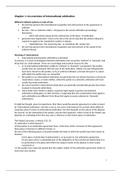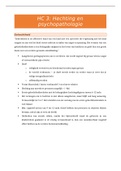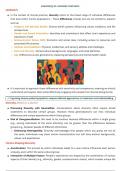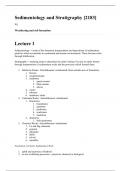Chapter 1: An overview of international arbitration
Different national systems or rules of law:
the law that governs the international recognition and enforcement of the agreement to
arbitrate
the law —the so-called lex arbitri—that governs the actual arbitration proceedings
themselves.
o which will almost always be the national law of the place of arbitration
generally most importantly—there is the law or the set of rules that the arbitral tribunal is
required to apply to the substantive matters in dispute.
o ‘applicable law’, the ‘governing law’, or sometimes the ‘proper law’
the law that governs the international recognition and enforcement of the award of the
arbitral tribunal.
Meaning of ‘international’
International and domestic arbitrations contrasted
In practice, it is usual to distinguish between arbitrations that are purely ‘national’ or ‘domestic’ and
those that are ‘international’. There are sound legal and practical reasons for this.
1. In an international arbitration (unlike its ‘national’ or ‘domestic’ counterpart), the parties
usually have no connection with the seat of the arbitration. Indeed, the seat will generally
have been chosen by the parties, or by an arbitral institution, precisely because it is a place
with which the parties have no connection
2. the parties to an international arbitration are generally (but not always) business or financial
corporations, states, or state entities, whilst the parties to a domestic arbitration will more
usually be private individuals.
3. the sums involved in international arbitrations are generally considerably greater than those
involved in domestic arbitrations
4. many states have chosen to adopt a separate legal regime to govern international
arbitrations taking place on their territory, recognising that the considerations that apply to
such arbitrations are different from those that apply to purely national (or ‘domestic’
arbitrations).
It might be thought, given its importance, that there would be general agreement on what is meant
by ‘international arbitration’. But this is not so. the word ‘international’ has at least three different
meanings when it comes to international arbitration: the first depends on the nature of the dispute;
the second, on the nationality of the parties; and the third approach, which is that of the Model Law,
depends on a blending of the first two, plus a reference to the chosen place of arbitration.
The Model Law states, in Article 1(3): (3)
An arbitration is international if:
(a) the parties to an arbitration agreement have, at the time of the conclusion of that agreement,
their places of business in different States; or
(b) one of the following places is situated outside the State in which the parties have their places of
business:
(i) the place of arbitration if determined in, or pursuant to, the arbitration agreement;
(ii) any place where a substantial part of the obligations of the commercial relationship is to
be performed or the place with which the subject-matter of the dispute is most closely
connected; or
(c) the parties have expressly agreed that the subject matter of the arbitration agreement relates to
more than one country.
1
,This definition combines the two criteria mentioned earlier and, for good measure, adds another: •
the internationality of the dispute is recognised in Article 1(3)(b)(i) and (ii); • the internationality of
the parties is recognised in Article 1(3)(a); and • Article 1(3)(c) grants the parties liberty to agree
amongst themselves that the subject matter of the arbitration agreement is ‘international’
Key elements of an international arbitration
a. the agreement to arbitrate;
b. the need for a dispute;
c. the commencement of an arbitration;
d. the arbitral proceedings;
e. the decision of the tribunal; and
f. the enforcement of the award.
a. The agreement to arbitrate
Before there can be a valid arbitration, there must first be a valid agreement to arbitrate. This is
recognised both by national laws and by international treaties. Under both the New York Convention
and the Model Law, recognition and enforcement of an arbitral award may be refused if the parties
to the arbitration agreement were under some incapacity or if the agreement was not valid under its
own governing law
1. An ‘agreement to arbitrate’ is usually expressed in an arbitration clause in a contract.
2. There is a second, less common, type of agreement to arbitrate, which is made once a
dispute has arisen. Such an agreement is generally known as a ‘submission agreement’.
3. an ‘agreement to arbitrate’, which is deemed to arise under international instruments, such
as a bilateral investment treaty (BIT) entered into by one state with another. This ‘agreement
to arbitrate’ in effect constitutes a ‘standing offer’ by the state concerned to resolve any
‘investment’ disputes by arbitration.
The Model Law, which came into force many years after the New York Convention, also envisages
arbitration as taking place only between parties who are parties to a written arbitration agreement.
Parties who agree to arbitration give up their right of recourse to the courts of law. It is not
unreasonable to require written evidence that they have, in fact, agreed to do this. Many laws of
arbitration insist on such evidence.
Revised Model Law: States that adopt this revised law are given two options. The first is to adhere to
the writing requirement, but with the definition of ‘writing’ extended to include electronic
communications of all types. The second option is to dispense altogether with the requirement that
an agreement to arbitrate should be in writing.
Even if the validity of the contract that contained the arbitration clause is challenged, the agreement
to arbitrate remains in being. This allows a claimant to begin arbitration proceedings, based on the
survival of the agreement to arbitrate as a separate agreement, independent of the contract of which
it formed part. It also allows an arbitral tribunal that is appointed pursuant to that arbitration
agreement to decide on its own jurisdiction—including any objections with respect to the existence
or validity of the arbitration agreement itself. The tribunal, in other words, is competent to judge its
own competence.
Indirect enforcement: Rules of law are adopted that provide that if one of the parties to an
arbitration agreement brings proceedings in a national court in breach of that agreement, those
proceedings will be stopped at the request of any other party to the arbitration agreement
2
,An arbitration agreement does not merely serve to establish the obligation to arbitrate, but is also a
basic source of the powers of the arbitral tribunal. In principle, and within the limits of public policy,
an arbitral tribunal may exercise such powers as the parties are entitled to confer and do confer
upon it, whether expressly or by implication, together with any additional or supplementary powers
that may be conferred by the law governing the arbitration.
The ‘agreement to arbitrate’ also establishes the jurisdiction of the arbitral tribunal.
b. The need for a dispute
If there is no dispute, there is nothing to resolve. The problem arises when one party has what it
regards as an ‘open and shut’ case to which there is no real defence. If there is an arbitration clause
in the underlying agreement with the debtor, the claimant may be directed to go to arbitration,
rather than to the courts—even though, in the time it takes to establish an arbitral tribunal, a judge
with summary powers may well have disposed of the case.
Even if a dispute exists, this may not be sufficient; it must also be a dispute that, in the words of the
New York Convention, is ‘capable of settlement by arbitration’. National laws may treat certain
disputes as being more suitable for determination by their own public courts of law, rather than by a
private arbitral tribunal.
c. The commencement of an arbitration
A formal notice must be given in order to start an arbitration. E.g. UNICTRAL Rules Article 3.
Generally, parties are free to choose their own tribunal—although, sometimes, the parties may have
surrendered this freedom by delegating the choice of a tribunal to a third party, such as an arbitral
institution.
d. The arbitral proceedings;
There are no compulsory rules of procedure in international arbitration. The rules that govern an
international arbitration are, first, the mandatory provisions of the lex arbitri—the law of the place of
arbitration—which are usually cast in very broad terms, and secondly, the rules that the parties
themselves may have chosen.
e. The decision of the tribunal
It frequently happens that, in the course of arbitral proceedings, a settlement may be reached
between the parties. Rules of arbitration usually make provision for this. Article 36(1) of the
UNCITRAL Rules, for example.
The power (and the duty) of an arbitral tribunal to make binding decisions distinguishes arbitration as
a method of resolving disputes from other procedures, such as mediation and conciliation, which aim
to arrive at a negotiated settlement. The procedure to be followed in order to arrive at a binding
decision is flexible, adaptable to the circumstances of each particular case. Nevertheless, it is a
judicial procedure and a failure by a tribunal to act judicially may be sanctioned by annulment or
non-enforcement of that tribunal's award.
d. the enforcement of the award
If the award is not carried out voluntarily, it may be enforced by legal proceedings—both locally (that
is, by the courts at the place where it was made) and internationally, under such international
conventions as the New York Convention.
An agreement to arbitrate is not only an agreement to take part in arbitral proceedings, but also an
agreement to carry out any resulting arbitral award.
3
, Most arbitral awards are carried out by the losing party or parties—reluctantly perhaps, but without
any formal legal compulsion. But while awards are binding, they are not always carried out
voluntarily, and it may be necessary to seek enforcement by a court of law.
But which court of law? This is a something that the winning party will need to consider. The usual
method for enforcing an award is to obtain judgment on it, and this will generally mean taking
enforcement proceedings either
(a) in the court of the country in which the losing party resides or has its place of business, or
(b) in the court of the country in which the losing party has assets that may be seized.
Why Arbitrate?
There are two reasons of prime importance:
Neutrality:
international arbitration gives the parties an opportunity to choose a ‘neutral’ place for the
resolution of their dispute and to choose a ‘neutral’ tribunal.
Enforcement:
an international arbitration, if carried through to its end, leads to a decision that is
enforceable against the losing party not only in the place where it is made, but also
internationally.
Additional reasons:
flexibility
So long as the parties are treated fairly, an arbitration may be tailored to meet the specific
requirements of the dispute, rather than conducted in accordance with fixed procedural
rules.
Confidentiality
The once-general confidentiality of arbitral proceedings has been eroded in recent years, but
it still remains a key attraction of arbitration.
Additional powers of arbitrators
For example, under some systems of law or some rules of arbitration, an arbitral tribunal
may be empowered to award compound interest, rather than simple interest, in cases in
which the relevant court has no power to do so.
Continuity of role
An arbitral tribunal is appointed to deal with one particular case, and its task is to follow that
case from beginning to end. This enables the tribunal to become acquainted with the parties,
their advisers, and the case, as it develops through the documents, pleadings, and evidence.
Such familiarity should help to move the case along—and it may indeed facilitate a
settlement.
Problems with arbitration
Multiparty arbitrations, joinder, and consolidation
Under Article 7 of the ICC Rules, the joinder of third parties is now possible at any time up to
confirmation or appointment of any arbitrator—or later, if all parties (including the third
party) agree. Under Article 8, in an arbitration with multiple parties, claims may be made by
one party against any other party, until signature or approval of the terms of reference —or
later, if authorised by the arbitral tribunal, which will consider the nature of the proposed
claims, the stage that the arbitration has reached, and other relevant circumstances.
Non-signatories
The problem of the so-called non-signatory occurs when a person or a legal entity that is not
a party to the arbitration agreement wishes to join in the proceedings as a claimant. It occurs
more usually, however, when one or more of the existing parties wishes to add another party
(for example a parent company).
4
Different national systems or rules of law:
the law that governs the international recognition and enforcement of the agreement to
arbitrate
the law —the so-called lex arbitri—that governs the actual arbitration proceedings
themselves.
o which will almost always be the national law of the place of arbitration
generally most importantly—there is the law or the set of rules that the arbitral tribunal is
required to apply to the substantive matters in dispute.
o ‘applicable law’, the ‘governing law’, or sometimes the ‘proper law’
the law that governs the international recognition and enforcement of the award of the
arbitral tribunal.
Meaning of ‘international’
International and domestic arbitrations contrasted
In practice, it is usual to distinguish between arbitrations that are purely ‘national’ or ‘domestic’ and
those that are ‘international’. There are sound legal and practical reasons for this.
1. In an international arbitration (unlike its ‘national’ or ‘domestic’ counterpart), the parties
usually have no connection with the seat of the arbitration. Indeed, the seat will generally
have been chosen by the parties, or by an arbitral institution, precisely because it is a place
with which the parties have no connection
2. the parties to an international arbitration are generally (but not always) business or financial
corporations, states, or state entities, whilst the parties to a domestic arbitration will more
usually be private individuals.
3. the sums involved in international arbitrations are generally considerably greater than those
involved in domestic arbitrations
4. many states have chosen to adopt a separate legal regime to govern international
arbitrations taking place on their territory, recognising that the considerations that apply to
such arbitrations are different from those that apply to purely national (or ‘domestic’
arbitrations).
It might be thought, given its importance, that there would be general agreement on what is meant
by ‘international arbitration’. But this is not so. the word ‘international’ has at least three different
meanings when it comes to international arbitration: the first depends on the nature of the dispute;
the second, on the nationality of the parties; and the third approach, which is that of the Model Law,
depends on a blending of the first two, plus a reference to the chosen place of arbitration.
The Model Law states, in Article 1(3): (3)
An arbitration is international if:
(a) the parties to an arbitration agreement have, at the time of the conclusion of that agreement,
their places of business in different States; or
(b) one of the following places is situated outside the State in which the parties have their places of
business:
(i) the place of arbitration if determined in, or pursuant to, the arbitration agreement;
(ii) any place where a substantial part of the obligations of the commercial relationship is to
be performed or the place with which the subject-matter of the dispute is most closely
connected; or
(c) the parties have expressly agreed that the subject matter of the arbitration agreement relates to
more than one country.
1
,This definition combines the two criteria mentioned earlier and, for good measure, adds another: •
the internationality of the dispute is recognised in Article 1(3)(b)(i) and (ii); • the internationality of
the parties is recognised in Article 1(3)(a); and • Article 1(3)(c) grants the parties liberty to agree
amongst themselves that the subject matter of the arbitration agreement is ‘international’
Key elements of an international arbitration
a. the agreement to arbitrate;
b. the need for a dispute;
c. the commencement of an arbitration;
d. the arbitral proceedings;
e. the decision of the tribunal; and
f. the enforcement of the award.
a. The agreement to arbitrate
Before there can be a valid arbitration, there must first be a valid agreement to arbitrate. This is
recognised both by national laws and by international treaties. Under both the New York Convention
and the Model Law, recognition and enforcement of an arbitral award may be refused if the parties
to the arbitration agreement were under some incapacity or if the agreement was not valid under its
own governing law
1. An ‘agreement to arbitrate’ is usually expressed in an arbitration clause in a contract.
2. There is a second, less common, type of agreement to arbitrate, which is made once a
dispute has arisen. Such an agreement is generally known as a ‘submission agreement’.
3. an ‘agreement to arbitrate’, which is deemed to arise under international instruments, such
as a bilateral investment treaty (BIT) entered into by one state with another. This ‘agreement
to arbitrate’ in effect constitutes a ‘standing offer’ by the state concerned to resolve any
‘investment’ disputes by arbitration.
The Model Law, which came into force many years after the New York Convention, also envisages
arbitration as taking place only between parties who are parties to a written arbitration agreement.
Parties who agree to arbitration give up their right of recourse to the courts of law. It is not
unreasonable to require written evidence that they have, in fact, agreed to do this. Many laws of
arbitration insist on such evidence.
Revised Model Law: States that adopt this revised law are given two options. The first is to adhere to
the writing requirement, but with the definition of ‘writing’ extended to include electronic
communications of all types. The second option is to dispense altogether with the requirement that
an agreement to arbitrate should be in writing.
Even if the validity of the contract that contained the arbitration clause is challenged, the agreement
to arbitrate remains in being. This allows a claimant to begin arbitration proceedings, based on the
survival of the agreement to arbitrate as a separate agreement, independent of the contract of which
it formed part. It also allows an arbitral tribunal that is appointed pursuant to that arbitration
agreement to decide on its own jurisdiction—including any objections with respect to the existence
or validity of the arbitration agreement itself. The tribunal, in other words, is competent to judge its
own competence.
Indirect enforcement: Rules of law are adopted that provide that if one of the parties to an
arbitration agreement brings proceedings in a national court in breach of that agreement, those
proceedings will be stopped at the request of any other party to the arbitration agreement
2
,An arbitration agreement does not merely serve to establish the obligation to arbitrate, but is also a
basic source of the powers of the arbitral tribunal. In principle, and within the limits of public policy,
an arbitral tribunal may exercise such powers as the parties are entitled to confer and do confer
upon it, whether expressly or by implication, together with any additional or supplementary powers
that may be conferred by the law governing the arbitration.
The ‘agreement to arbitrate’ also establishes the jurisdiction of the arbitral tribunal.
b. The need for a dispute
If there is no dispute, there is nothing to resolve. The problem arises when one party has what it
regards as an ‘open and shut’ case to which there is no real defence. If there is an arbitration clause
in the underlying agreement with the debtor, the claimant may be directed to go to arbitration,
rather than to the courts—even though, in the time it takes to establish an arbitral tribunal, a judge
with summary powers may well have disposed of the case.
Even if a dispute exists, this may not be sufficient; it must also be a dispute that, in the words of the
New York Convention, is ‘capable of settlement by arbitration’. National laws may treat certain
disputes as being more suitable for determination by their own public courts of law, rather than by a
private arbitral tribunal.
c. The commencement of an arbitration
A formal notice must be given in order to start an arbitration. E.g. UNICTRAL Rules Article 3.
Generally, parties are free to choose their own tribunal—although, sometimes, the parties may have
surrendered this freedom by delegating the choice of a tribunal to a third party, such as an arbitral
institution.
d. The arbitral proceedings;
There are no compulsory rules of procedure in international arbitration. The rules that govern an
international arbitration are, first, the mandatory provisions of the lex arbitri—the law of the place of
arbitration—which are usually cast in very broad terms, and secondly, the rules that the parties
themselves may have chosen.
e. The decision of the tribunal
It frequently happens that, in the course of arbitral proceedings, a settlement may be reached
between the parties. Rules of arbitration usually make provision for this. Article 36(1) of the
UNCITRAL Rules, for example.
The power (and the duty) of an arbitral tribunal to make binding decisions distinguishes arbitration as
a method of resolving disputes from other procedures, such as mediation and conciliation, which aim
to arrive at a negotiated settlement. The procedure to be followed in order to arrive at a binding
decision is flexible, adaptable to the circumstances of each particular case. Nevertheless, it is a
judicial procedure and a failure by a tribunal to act judicially may be sanctioned by annulment or
non-enforcement of that tribunal's award.
d. the enforcement of the award
If the award is not carried out voluntarily, it may be enforced by legal proceedings—both locally (that
is, by the courts at the place where it was made) and internationally, under such international
conventions as the New York Convention.
An agreement to arbitrate is not only an agreement to take part in arbitral proceedings, but also an
agreement to carry out any resulting arbitral award.
3
, Most arbitral awards are carried out by the losing party or parties—reluctantly perhaps, but without
any formal legal compulsion. But while awards are binding, they are not always carried out
voluntarily, and it may be necessary to seek enforcement by a court of law.
But which court of law? This is a something that the winning party will need to consider. The usual
method for enforcing an award is to obtain judgment on it, and this will generally mean taking
enforcement proceedings either
(a) in the court of the country in which the losing party resides or has its place of business, or
(b) in the court of the country in which the losing party has assets that may be seized.
Why Arbitrate?
There are two reasons of prime importance:
Neutrality:
international arbitration gives the parties an opportunity to choose a ‘neutral’ place for the
resolution of their dispute and to choose a ‘neutral’ tribunal.
Enforcement:
an international arbitration, if carried through to its end, leads to a decision that is
enforceable against the losing party not only in the place where it is made, but also
internationally.
Additional reasons:
flexibility
So long as the parties are treated fairly, an arbitration may be tailored to meet the specific
requirements of the dispute, rather than conducted in accordance with fixed procedural
rules.
Confidentiality
The once-general confidentiality of arbitral proceedings has been eroded in recent years, but
it still remains a key attraction of arbitration.
Additional powers of arbitrators
For example, under some systems of law or some rules of arbitration, an arbitral tribunal
may be empowered to award compound interest, rather than simple interest, in cases in
which the relevant court has no power to do so.
Continuity of role
An arbitral tribunal is appointed to deal with one particular case, and its task is to follow that
case from beginning to end. This enables the tribunal to become acquainted with the parties,
their advisers, and the case, as it develops through the documents, pleadings, and evidence.
Such familiarity should help to move the case along—and it may indeed facilitate a
settlement.
Problems with arbitration
Multiparty arbitrations, joinder, and consolidation
Under Article 7 of the ICC Rules, the joinder of third parties is now possible at any time up to
confirmation or appointment of any arbitrator—or later, if all parties (including the third
party) agree. Under Article 8, in an arbitration with multiple parties, claims may be made by
one party against any other party, until signature or approval of the terms of reference —or
later, if authorised by the arbitral tribunal, which will consider the nature of the proposed
claims, the stage that the arbitration has reached, and other relevant circumstances.
Non-signatories
The problem of the so-called non-signatory occurs when a person or a legal entity that is not
a party to the arbitration agreement wishes to join in the proceedings as a claimant. It occurs
more usually, however, when one or more of the existing parties wishes to add another party
(for example a parent company).
4











